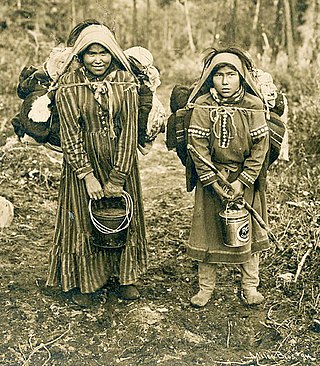
John Smelcer is an American poet and novelist whose claims to Native American (Ahtna) heritage and citizenship have been the subject of multiple controversies.

John Smelcer is an American poet and novelist whose claims to Native American (Ahtna) heritage and citizenship have been the subject of multiple controversies.
Neither of Smelcer's birth parents is Native American. Smelcer is a shareholder in Ahtna, Incorporated, an Alaska Native Regional Corporation associated with the Ahtna tribe. Based on unique laws in Alaska that allow for non-Natives to join a tribal corporation, he enrolled with the Native Village of Tazlina, located in Tazlina, Alaska. [lower-alpha 1] [1] [2]
He is the adopted son of a Native American father. [1] [2] [3]
Smelcer is married to Dr. Amber Johnson, Chair of the department of Sociology, Anthropology, and Justice Systems Department at Truman State University. [4]
Smelcer was appointed as a professor at the University of Alaska Anchorage as part of an effort to increase the number of ethnic minority faculty. [5] [6] However, his credibility was subsequently called into question as details of claimed publications in the New Yorker and elsewhere turned out to be incorrect. Smelcer resigned from the university in the midst of its investigation. [7]
Smelcer is the literary editor of Rosebud, a literary journal published in Madison, Wisconsin. [8]
In 2004, Smelcer won a $10,000 James Jones Literary Society First Novel Award to support the writing of his 2007 novel, The Trap. [9] The award was rescinded in 2015 when it was discovered that Smelcer had published an earlier novel under a pen name. [1] The Trap, a young adult novel, was well received. [10] The Wisconsin State Journal called the book a "spare and lyrical" story about a boy and his grandfather facing up to challenges in a remote part of Alaska. [11] Without Reservation (Truman State University Press) won the 2004 Milt Kessler Poetry Book Award given by Binghamton University. [2] Stealing Indians was nominated for a PEN Center USA literary prize. But was subject to some controversy. [2]
In 2016, two of Smelcer's poems were published in the Kenyon Review . A backlash among Native American writers led to the journal withdrawing this publication and replacing the poem with a statement from the editor that read in part "these poems contained damaging stereotypes of Native people. I deeply regret the manifest distress this has caused and take full responsibility." [12] First Nation author Terese Marie Mailhot (Seabird Island First Nation) subsequently wrote that "I resent people with dubious stories, who benefit from white privilege and refuse to be accountable to hardworking Natives who have to struggle against oppression and stigma every day." [13]
In 2017, Smelcer's young adult novel Stealing Indians was nominated for a PEN literary award. In response, Nambe Pueblo educator Debbie Reese, among many others, protested at Smelcer's inclusion. Smelcer's nomination was withdrawn. Smelcer was also accused of fabricating a promotional cover quotation for himself, allegedly from Chinua Achebe, calling his book "a masterpiece", as Achebe had died four years prior to his writing his novel. [14] [15] Rich Smith in The Stranger described him as "Native American Literature's living con job," though confirming that Smelcer is an enrolled Tazlina village citizen. [1]

Karen Louise Erdrich is an American author of novels, poetry, and children's books featuring Native American characters and settings. She is an enrolled member of the Turtle Mountain Band of Chippewa Indians, a federally recognized tribe of Ojibwe people.

Chinua Achebe was a Nigerian novelist, poet, and critic who is regarded as a central figure of modern African literature. His first novel and magnum opus, Things Fall Apart (1958), occupies a pivotal place in African literature and remains the most widely studied, translated, and read African novel. Along with Things Fall Apart, his No Longer at Ease (1960) and Arrow of God (1964) complete the "African Trilogy". Later novels include A Man of the People (1966) and Anthills of the Savannah (1987). In the West, Achebe is often referred to as the "father of African literature", although he vigorously rejected the characterization.

Gerald Robert Vizenor is an American writer and scholar, and an enrolled member of the Minnesota Chippewa Tribe, White Earth Reservation. Vizenor also taught for many years at the University of California, Berkeley, where he was Director of Native American Studies. With more than 30 books published, Vizenor is Professor Emeritus at the University of California, Berkeley, and Professor of American Studies at the University of New Mexico.

The Ahtna are an Alaska Native Athabaskan people of the Athabaskan-speaking ethnolinguistic group. The people's homeland called Atna Nenn', is located in the Copper River area of southern Alaska, and the name Ahtna derives from the local name for the Copper River. The total population of Ahtna is estimated at around 1,427.

The Copper River or Ahtna River, Ahtna Athabascan ‘Atna’tuu, "river of the Ahtnas", Tlingit Eeḵhéeni, "river of copper", is a 290-mile (470 km) river in south-central Alaska in the United States. It drains a large region of the Wrangell Mountains and Chugach Mountains into the Gulf of Alaska. It is known for its extensive delta ecosystem, as well as for its prolific runs of wild salmon, which are among the most highly prized stocks in the world. The river is the tenth largest in the United States, as ranked by average discharge volume at its mouth.

Sherman Joseph Alexie Jr. is a Native American novelist, short story writer, poet, screenwriter, and filmmaker. His writings draw on his experiences as an Indigenous American with ancestry from several tribes. He grew up on the Spokane Indian Reservation and now lives in Seattle, Washington.

Chang-rae Lee is a Korean-American novelist and a professor of creative writing at Stanford University. He was previously Professor of Creative Writing at Princeton and director of Princeton's Program in Creative Writing.

Ahtna or Ahtena is the Na-Dené language of the Ahtna ethnic group of the Copper River area of Alaska. The language is also known as Copper River or Mednovskiy.

The Denaʼina, or formerly Tanaina, are an Alaska Native Athabaskan people. They are the original inhabitants of the south central Alaska region ranging from Seldovia in the south to Chickaloon in the northeast, Talkeetna in the north, Lime Village in the northwest and Pedro Bay in the southwest. The Denaʼina homeland is more than 41,000 sq mi (110,000 km2) in area. They arrived in the south-central Alaska sometime between 1,000 and 1,500 years ago. They were the only Alaskan Athabaskan group to live on the coast. The Denaʼina have a hunter-gatherer culture and a matrilineal system. The Iditarod Trail's antecedents were the native trails of the Denaʼina and Deg Hitʼan Athabaskan Native Alaskans and the Inupiaq Inuit.

The Institute of American Indian Arts (IAIA) is a public tribal land-grant college in Santa Fe, New Mexico, United States. The college focuses on Native American art. It operates the Museum of Contemporary Native Arts (MoCNA), which is housed in the historic Santa Fe Federal Building, a landmark Pueblo Revival building listed on the National Register of Historic Places as Federal Building. The museum houses the National Collection of Contemporary Indian Art, with more than 7,000 items.
Maurice Frank Kenny was an American poet who identified as Mohawk descent.

Joy Harjo is an American poet, musician, playwright, and author. She served as the 23rd United States Poet Laureate, the first Native American to hold that honor. She was also only the second Poet Laureate Consultant in Poetry to have served three terms. Harjo is a member of the Muscogee Nation and belongs to Oce Vpofv. She is an important figure in the second wave of the literary Native American Renaissance of the late 20th century. She studied at the Institute of American Indian Arts, completed her undergraduate degree at University of New Mexico in 1976, and earned an MFA degree at the University of Iowa in its creative writing program.
Louis Dean Owens was a novelist and scholar who claimed Choctaw, Cherokee, and Irish-American descent. He is known for a series of Native-themed mystery novels and for his contributions to the then-fledgling field of Native American Studies. He was also a professor of English and Native American studies, and frequently contributed articles, literary criticism and reviews to periodicals. Owens died by suicide in 2002.

The Alaskan Athabascans, Alaskan Athabascans, Alaskan Athapascans or Dena are Alaska Native peoples of the Athabaskan-speaking ethnolinguistic group. They are the original inhabitants of the interior of Alaska.
Ig Publishing is a New York-based press devoted to publishing original literary fiction and political and cultural nonfiction. The editor is writer Robert Lasner, and the publisher is Elizabeth Clementson. The press was founded in 2002.
Terese Marie Mailhot is a First Nation Canadian writer, journalist, memoirist, and teacher.

There There is the debut novel by Cheyenne and Arapaho author Tommy Orange. Published in 2018, the book follows a large cast of Native Americans living in the Oakland, California area and contains several essays on Native American history and identity. The characters struggle with a wide array of challenges, ranging from depression and alcoholism, to unemployment, fetal alcohol syndrome, and the challenges of living with an "ambiguously nonwhite" ethnic identity in the United States. All of the characters unite at a community powwow and its attempted robbery.
Owanah P. Anderson was a Choctaw author and indigenous rights activist. Though Anderson published two books, Jamestown Commitment: The Episcopal Church and the American Indian and 400 Years: Anglican/Episcopal Mission Among American Indians, and co-authored multiple other publications, she was most recognized for her work with the Native American Ministries of the Episcopal Church as well as for her achievements in improving the lives of indigenous peoples, especially women. Anderson held a variety of jobs throughout her professional career that focused on expanding women's access to healthcare as well as their educational and professional opportunities.
Katie John was an Alaska Native advocate and cultural expert. John was a plaintiff in a court case against the United States challenging the denial of Native subsistence fishing rights, known throughout Alaska as "the Katie John case." She was instrumental in developing an alphabet for the Ahtna language and preserving the culture and traditional way of life of the Ahtna Athabaskan people.
{{cite web}}: CS1 maint: archived copy as title (link)literary awards to John Smelcer of Chugiak, Alaska, for his first novel